PORTFOLIO
01 Coordination

Rituals across the world often involve synchronized dancing, chanting, and music making. Examples include the famous Maori haka dance adopted by All Blacks as their pre-match routine, Hindu mantras, or simply collective standing up and kneeling during Christian mass. Even outside religious contexts, synchrony remains a powerful tool creating entitative units such as during army marches. While the effects of synchronous coordinated movements on group cohesion were previously well documented, my work focuses on investigating the specific mechanisms facilitating the synchrony effects. I argue that by engaging in coordinated movement, chanting, and music making, our group identities are forged by synchronous neurophysiological responses, translating into increased coordination outside ritual contexts.
Publications:
Lang, M., Xygalatas, D., Kavanagh, C. M., Boccardi, N., Halberstadt, J., Jackson, C., Martínez, M., Reddish, P., Tong, E. M. W., Vázquez, A., Whitehouse, H., Yamamoto, M. E., Yuki, M., & Gomez, A. (2021). Outgroup threat and the emergence of cohesive groups : A cross-cultural examination. Group Processes and Intergroup Relations, 1–21.
Chvaja, R., Kundt, R., & Lang, M. (2020). The effects of synchrony on group moral hypocrisy. Frontiers in Psychology, 11, 544589. https://doi.org/10.3389/fpsyg.2020.544589
Lang, M., Bahna, V., Shaver, J.H., Reddish, P., & Xygalatas, D. (2017). Sync to Link: Endorphin-mediated Effects of Synchrony on Cooperation. Biological Psychology, 127, 191-197.
Lang, M., Shaw, D. J., Reddish, P., Wallot, S., Mitkidis, P., and Xygalatas, D. (2016). Lost in the Rhythm: Effects of Rhythm on Subsequent Interpersonal Coordination. Cognitive Science, 40 (7), 1797-1815.
02 Cooperation

Group living presents people with all sorts of challenges that require higher-level cognitive coordination. Consider a typical stag hunt scenario: if Frank and Jane decide to go for a risky stag hunt, how can they be sure that one of them will not run away in a critical moment during the hunt? How can we build trust within our communities that allow us to reap the benefits of mutual cooperation? I argue that ritual behavior evolved as a communication platform affording group coordination by stabilizing a broad scope of conventional indices. Be it it partaking in collective rituals, sacrificing pigs to ancestors, or piercing one's body with hundreds of needles, rituals use conventional costly indices of commitment together with indices of group unity to facilitate stable and reliable communication that serves as a basis for cooperative cultural niches (mostly religions) . The rigidity and stereotypy of rituals help to stabilize and perpetuate cooperative niches while internalizing normative behavioral patterns in ritual participants. This can prove useful in various cooperative dilemmas where internalized norms activated through contextual factors (sacred cues) afford complex coordination patterns.
Publications:
Xygalatas, D., Lang, M., Maňo, P., Krátký, J., & Fischer, R. (In Press). Emotional contagion in a collective ritual. American Journal of Human Biology, https://doi.org/10.1002/ajhb.24111
Kundt, R. & Lang, M. (In press). Communicating cooperative intentions drove the selection of collective ritual in hominins. Religion, Brain & Behavior. 10.1080/2153599X.2023.2197986
Lang, M. & Kundt, R., (In press). The evolution of human ritual behavior as a cooperative signaling platform. Religion, Brain & Behavior. http://dx.doi.org/10.1080/2153599X.2023.2197977
Lang, M. (2024). Formalized rituals may have preceded the emergence of religions. Religion, Brain & Behavior. https://doi.org/10.1080/2153599X.2023.2168737
Lang, M., Chvaja, R., Purzycki, B. G. (2024). The role of costly commitment signals in assorting cooperators during intergroup conflict. Evolution & Human Behavior. https://doi.org/10.1016/j.evolhumbehav.2024.01.003
Chvaja, R., Chinchilla, J., Gomez, A., Lang, M. (In 2023). Religious costly signal induces more trustworthiness than secular costly signal: A study of pilgrimage to Santiago de Compostela. European Journal of Social Psychology. https://doi.org/10.1002/ejsp.2975
Chvaja, R., Horský, J., Lang, M., & Kundt, R. (2022). Positive association between ritual performance and perceived objectivity of moral norms. The International Journal for the Psychology of Religion, 1–21. https://doi.org/10.1080/10508619.2022.2121454
Lang, M., Chvaja, R., Purzycki, B. G., Václavík, D., & Staněk, R. (2022). Advertising cooperative phenotype through costly signals facilitates collective action. Royal Society Open Science, 9, 202202. https://doi.org/10.1098/rsos.202202
Xygalatas, D., Maňo, P., Bahna, V., Kundtová Klocová, E., Kundt, R., Lang, M., & Shaver, J. H. (2021). Social inequality and signaling in a costly ritual. Evolution and Human Behavior, 42(6), 524–533. https://doi.org/10.1016/j.evolhumbehav.2021.05.006
Nichols, A. D., Lang, M., Kavanagh, C., Kundt, R., Yamada, J., Ariely, D., & Mitkidis, P. (2020). Replicating and extending the effects of auditory religious cues on dishonest behavior. PLoS ONE, 15(8), e0237007.
Lang, Martin, Benjamin G. Purzycki, Coren L. Apicella, Quentin D. Atkinson, Alexander Bolyanatz, Emma Cohen, Carla Handley, Eva Kundtová Klocová, Carolyn Lesorogol, Sarah Mathew, Rita A. McNamara, Cristina Moya, Caitlyn D. Placek, Montserrat Soler, Thomas Vardy, Jonathan L. Weigel, Aiyana K. Willard, Dimitris Xygalatas, Ara Norenzayan, & Joseph Henrich. (2019). Moralizing Gods, Impartiality, and Religious Parochialism across 15 Societies.” Proceedings of the Royal Society B: Biological Sciences, 286 (1898), 1-10.
Purzycki, B. G,, & Lang, M. (2019). Identity fusion, outgroup relations, and sacrifice: A cross-cultural test. Cognition, 186, 1-6.
Shaver, J. H., Lang, M., Krátký, J., Klocová, E. K., Kundt, R., & Xygalatas, D. (2018). The boundaries of trust: Cross-religious and cross-ethnic field experiments in Mauritius. Evolutionary Psychology, 16(4), 1–15.
Shaver, J. H., DiVietro, S., Lang, M., & Sosis, R. (2018). Costs Do Not Explain Variance in Trust Among Secular Groups. Journal of Cognition and Culture, 18 (1-2), 180-204.
Xygalatas, D., Kotherová, S., Maňo, P., Kundt, R., Cigán, J., Kundtová Klocová, E., & Lang. M. (2018). Big Gods in Small Places: The Random Allocation Game in Mauritius. Religion, Brain and Behavior, 8 (2), 243-261.
Pazhoohi, F., Lang, M., Xygalatas, D., & Grammer, K. (2016). Religious Veiling as a Mate-Guarding Strategy: Effects of Environmental Pressures on Cultural Practices. Evolutionary Psychological Science, Epub before print.
Xygalatas, D, & Lang, M. (2017). Religion and prosociality. In N. Clements (Ed.), Macmillan Interdisciplinary Handbooks. Religion: Mental Religion. (pp. 119–133). Farmington Hills, MI: Macmillan Reference USA.
Lang, M., Mitkidis, P., Kundt, R., Nichols, A., Krajčíková, L., & Xygalatas, D. (2016). Music as a Sacred Cue: Effects of Religious Music on Moral Behavior. Frontiers in Psychology, 7 (814), 1-13.
03 Anxiety

Humans live in complex world defined by environmental uncertainties and stresses that need to be controlled in order to thrive. Possessing a suit of cognitive and physiological adaptations such as anxiety, people are motivated to exercise precaution and try to regain control over threats and adversities. However, whenever this control cannot be attained by functional means such as during wars, untreatable diseases, or risky hunting, anxiety increases internal disorder that threatens to destabilize the human complex cognitive system. I argue that by engaging in stereotypical and predictable behavioral and verbal patterns, that is to say by engaging in ritualized behavior, people decrease their prediction error and minimize internal entropy when facing uncontrollable situations. Carrying out low-entropy stereotypical actions may help regain a feeling of control over uncertain situations that might, in turn, result in anxiety alleviation.
Publications:
Lang, M., & Chvaja, R. (2023). Examining the Possible Adaptive Value of Ritualized Behavior. In Yair Loir, Justin E. Lane. The Routledge Handbook of Evolutionary Approaches to Religion. New York, NY: Routledge, 2023. s. 164-184
Lang, M., Krátký, J., & Xygalatas, D. (2022). Effects of predictable behavioral patterns on anxiety dynamics.Scientific Reports 12, 19240.
Lang, M., Krátký, J., & Xygalatas, D. (2020). The role of ritual behavior in anxiety reduction: An investigation of Marathi religious practices in Mauritius. Philosophical Transactions of the Royal Society B, 375(1805), 20190431.
Xygalatas, D., Khan, S., Lang, M., Kundt, R., Kundotvá Klocová, E., Krátký, J., & Shaver, J.H. (2019). Effects of Extreme Ritual Practices on Psychophysiological Well-Being, Current Anthropology, 60(5).
Lang, M., Krátký, J., Shaver, J.H., Jerotijević, D., & Xygalatas, D. (2019). Is Ritual Behavior a Response to Anxiety? In: Slone, D. J., McCorkle Jr., W. W. The Cognitive Science of Religion: A Methodological Introduction to Key Empirical Studies. London: Bloomsbury Academic, 181-191.
Lang, M. (2020). Multifunctional Religious Systems and Perturbed Dynamics of Psychological Wellbeing. Religion, Brain, & Behavior, 10 (2), 179-184.
Lang, M., & Sosis, R. (2017). Uncertain Malinowski: The Importance of Pre-ritual Stress Data. Current Anthropology, 52 (2), 276-278.
Krátký, J., Lang, M., Shaver, J. H., Jerotijević, D., and Xygalatas, D. (2016). Anxiety and Ritualization: Can Attention Discriminate Compulsion from Routine? Communicative & Integrative Biology, 9 (3), e1174799.
Lang, M., Krátký, J., Shaver, J. H., Jerotijević, D., and Xygalatas, D. (2015). Effects of Anxiety on Spontaneous Ritualized Behavior. Current Biology, 25 (14), 1892–1897.
04 Other publications
Theiss Bendixen, Aaron D Lightner, Coren Apicella, Quentin Atkinson, Alexander Bolyanatz, Emma Cohen, Carla Handley, Joseph Henrich, Eva Kundtov, Carolyn Lesorogol, Sarah Mathew, Rita A McNamara, Cristina Moya, Ara Norenzayan, Caitlyn Placek, Montserrat Soler, Tom Vardy, Jonathan Weigel, Aiyana K Willard, Dimitris Xygalatas, Martin Lang, Benjamin Grant Purzycki. (2023). Gods are watching and so what? Moralistic supernatural punishment across 15 cultures. Evolutionary Human Sciences,5, E18. doi:10.1017/ehs.2023.15
Baimel, A., Apicella, C., Atkinson, Q., Bolyanatz, A., Cohen, E., Handley, C., Henrich, J., Kundtová Klocová, E., Lang, M., Lesogorol, C., Mathew, S., McNamara, R., Moya, C., Norenzayan, A., Placek, C. D., Soler, M., Vardy, T., Weigel, J., Willard, A., … Purzycki, B. (2022). Material insecurity predicts greater commitment to moralistic and less commitment to local deities: A cross-cultural investigation. Religion, Brain & Behavior, 12(1–2), 4–17. https://doi.org/10.1080/2153599x.2021.2006287
Kundtová Klocová, E., Lang, M., Maňo, P., Kundt, R., & Xygalatas, D. (2022). Cigarettes for the dead: Effects of sorcery beliefs on parochial prosociality in Mauritius. Religion, Brain & Behavior, 12(1–2), 116–131. https://doi.org/10.1080/2153599x.2021.2006286
Purzycki, B. G., Lang, M., Henrich, J., & Norenzayan, A. (2022a). Guiding the evolution of the evolutionary sciences of religion: A discussion. Religion, Brain & Behavior, 12(1–2), 226–232. https://doi.org/10.1080/2153599x.2021.2021552
Purzycki, B. G., Lang, M., Henrich, J., & Norenzayan, A. (2022b). The Evolution of Religion and Morality project: Reflections and looking ahead. Religion, Brain & Behavior, 12(1–2), 190–211. https://doi.org/10.1080/2153599x.2021.2021546
Purzycki, B. G., Willard, A. K., Klocová, E. K., Apicella, C., Atkinson, Q., Bolyanatz, A., Cohen, E., Handley, C., Henrich, J., Lang, M., Lesorogol, C., Mathew, S., McNamara, R. A., Moya, C., Norenzayan, A., Placek, C., Soler, M., Vardy, T., Weigel, J., … Ross, C. T. (2022). The moralization bias of gods’ minds: A cross-cultural test. Religion, Brain & Behavior, 12(1–2), 38–60. https://doi.org/10.1080/2153599x.2021.2006291
Soler, M., Purzycki, B. G., & Lang, M. (2022). Perceptions of moralizing agents and cooperative behavior in Northeastern Brazil. Religion, Brain & Behavior, 12(1–2), 132–149. https://doi.org/10.1080/2153599x.2021.2006285
Vardy, T., Moya, C., Placek, C. D., Apicella, C. L., Bolyanatz, A., Cohen, E., Handley, C., Kundtová Klocová, E., Lesorogol, C., Mathew, S., McNamara, S. A., Purzycki, B. G., Soler, M., Weigel, J. L., Willard, A. K., Xygalatas, D., Norenzayan, A., Henrich, J., Lang, M., & Atkinson, Q. D. (2022). The religiosity gender gap in 14 diverse societies. Religion, Brain & Behavior, 12(1–2), 18–37. https://doi.org/10.1080/2153599x.2021.2006292
Beheim, B., Atkinson, Q., Bulbulia, J., Gervais, W., Gray, R., Henrich, J., Lang, M., Monroe, M., Muthukrishna, M., Norenzayan, A., Purzycki, B., Shariff, A., Slingerland, E., Spicer, R., & Willard, A. (2021). Treatment of missing data determines conclusions regarding moralizing gods. Nature, 595(8), E29–E34.
Shaver, J. H., White, T. A. J., Vakaoti, P., & Lang, M. (2021). A comparison of self-report, systematic observation and third-party judgments of church attendance in a rural Fijian Village. PLoS ONE, 16(10), e0257160. https://doi.org/10.1371/journal.pone.0257160
van Mulukom, V., & Lang, M. (2021). Religious experiences are interpreted through priors from cultural frameworks supported by imaginative capacity rather than special cognition. Journal for the Cognitive Science of Religion, 7(1), 39–53. https://doi.org/10.1558/jcsr.19803
Lang, M., & Kundt, R. (2020). Evolutionary, Cognitive, and Contextual Approaches to the Study of Religious Systems: A Proposition of Synthesis. Method and Theory in the Study of Religion, 32 (1), 1-46.
Lang, M. (2019). The evolutionary paths to collective rituals: An interdisciplinary perspective on the origins and functions of the basic social act. Archive for the Psychology of Religion 41 (3), 224-252.
Lang, M., & Kundt, R. (2016). Can Predictive Coding Explain Past Experiences? Religion, Brain, & Behavior, 7 (1), 71-73.
05Popular media coverage
Coverage by National Geographic
Coverage by TIME Magazine
Coverage by New Scientist
Interview on Harvesting Happiness
Coverage by VICE magazine
Interview on Verge of Discovery
Coverage by Discover Magazine
Popular summary for anxiety.org
analytical skills

EXPERIENCE
2018 -
MASARYK UNIVERSITY
LEVYNA
I am currently the director of LEVYNA where I investigate the evolution of ritual behavior and the relationship between anxiety and rituals.
2016 - 2018
HARVARD UNIVERSITY
Human Evolutionary Biology
I worked a postdoctoral fellow with Joseph Henrich on The Evolution of Religion and Morality Project under CERC. This project collected random allocation game and dictator game data across 15 small-scale societies together with a suit of religiosity questions to test the effects of belief in omniscient and punitive moralizing gods on cooperation.
2014 - 2016
UNIVERSITY OF CONNECTICUT
Anthropology
I was a graduate researcher under the supervision of Dimitris Xygalatas working in Experimental Anthropology lab. During my stay, I was developing physiological and sociometric measures of ritual behavior as well as collecting experimentaldata in Mauritius.
2011 - 2014
MASARYK UNIVERSITY
LEVYNA
During my work in Laboratory for the Experimental Study of Religions (LEVYNA) I was trained in using experimental methods to tackle long-standing questions in religious studies such as whether religion promotes prosociality. I also developed a solid basis for signal processing, statistical analyses, and dynamical systems analysis.
2005 - 2016
MASARYK UNIVERSITY
Study of Religions
I obtained my bachelor, master, and Ph.D. degrees at the Department for the Study of Religions under the supervision of Aleš Chalupa. I was trained as a classical religious scholar with focus on early Christianity and new religious movements. I also obtained a bachelor degree from media studies.
ABOUT ME
I am a scholar of religionby training, psychologist by methodology, anthropologist by interests, and eclectic scientist at heart. My work lies at the intersection between the humanities and the cognitive and behavioral sciences, combining laboratory experiments with field studies to explore the effects of ritual on the individual and group level. I use physiological measurements, motion capture, surveys, machine-learning algorithms, and linear and nonlinear analyses to understand the evolution and function of the basic human social act.

martinlang@mail.muni.cz
LEVYNA Laboratory for the Experimental Research of Religion, Masaryk University,
Arna Nováka 1, Brno, 60200, Czech Republic
© 2024 by Martin Lang


